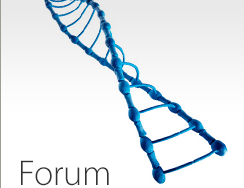

Researchers continue to uncover genetic variants that play a role in human behavior. Some of these variants may predispose carriers to criminality when combined with environmental triggers. How should our courts handle this new information?
The film "The Perfect 46" depicts a future in which genetic information is used by couples to determine whether or not they should have children together. The company that provides the genome screening service used by these couples hopes to eradicate certain heritable diseases from the human species. Is this a eugenic pursuit, and does "eugenics" have to be a dirty word?
Rare genetic anomalies give a small contingent of athletes a significant and undeniable advantage. Should these "mutants" be allowed to participate in traditional athletic competitions? How can sports organizations treat these individuals fairly without negatively impacting other athletes?
Many Americans are unaware that the United States had a robust eugenics movement during the first few decades of the 20th century. Why isn't this dark chapter more widely known?
Current laws are designed to protect genetic privacy. As genetic testing becomes more pervasive, certain situations may test whether or not this privacy should be absolute.
A moving video interview with Kenneth Serbin, PhD, who is gene positive for the mutation that causes Huntington's disease. Dr. Serbin shares how he came to the decision to be tested and the impact the results have had on his life since.
A new technique for replacing faulty mitochondria in embryos has been successful in animal models. Should scientists begin human trials to help women with mitochondrial disorders that are otherwise unable to have biological children?
Noninvasive prenatal diagnosis is a new technology that allows for genetic testing of fetuses by a simple maternal blood draw. While there are many important applications for NIPD, some fear it will be used for sex selection.
Huntington's disease is an adult onset neurodegenerative disorder that causes death after a lengthy period of decline. A genetic test is available for individuals that wish to find out if they carry the predisposing genetic mutation. Those with the mutation have a 50% chance of passing it to their offspring. Do parents have the right to test their children before the children are old enough to give consent?
Last week the FDA took action to stop 23andMe from marketing their personal genome services based on failure to demonstrate the efficacy and utility of their product. Did the FDA overstep, or were their actions warranted?
The consumer genetics company 23andMe was recently granted a patent that has applications for selecting traits in babies that are a product of sperm donation or IVF with a gamete donor. Are designer babies close to becoming reality?
New technologies, including advances in genetic testing, place REAL people in difficult situations. We invite you to meet a woman whose family has been devastated by ALS (Lou Gehrig's disease).
Genetic testing for hereditary diseases can put family members at odds. Does the "right to know" about inheritance of a disease outweigh someone else's "right NOT to know"?
The ACTN3 gene has been implicated in sports performance, and genetic testing for ACTN3 variants is available. Some companies are marketing the tests to parents so they can choose an appropriate sport for their child based on genetic aptitude.
Current laws do much to protect against genetic discrimination in employment and health insurance coverage. However, loopholes exist that present circumstances in which individuals may be discriminated against. What would you do when faced with a difficult hiring decision that puts your financial security at risk?
The technology to safely clone a human is not yet reality, but some are already planning to pursue cloning when it becomes available. Under what circumstances is human cloning permissible, if any?
The recent discovery of a new strain of avian flu in China has reignited the debate about how to study extremely pathogenic influenza strains. In particular, should genetic manipulation be used to create even more deadly strains to facilitate lines of questioning that could not be addressed otherwise, or are the potential risks too high?
Mississippi just passed a law that mandates DNA collection from some babies born to teenage mothers when paternity is in question. Does this new law violate personal rights?
While it is clear that genetics play a role in mental illness, the predictive value of genetic testing for psychiatric disorders is still unproven. Could these tests do more harm than good?
The FDA is in the final stages of approving the first genetically modified food animal, a salmon, for human consumption. Will you eat it?
Do you own your DNA sequence? The law is not clear on this issue, particularly if you've donated DNA for research or as part of a medical procedure.
Savior siblings are genetically screened as embryos to ensure they are an immunological match to an older sibling that is ill and requires a bone marrow transplant. This practice raises many ethical questions.
The Supreme Court just affirmed the practice of taking DNA at arrest (not just conviction) for serious crimes. Should DNA also be taken at arrest for less serious offenses as a way to strengthen the DNA databases used by law enforcement?
Would you like to know what is in your genome? What if you didn't ask for the information?
Welcome to our forum! Here is what it’s about.















